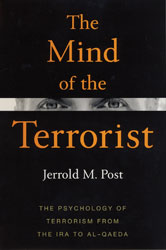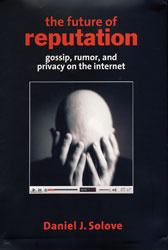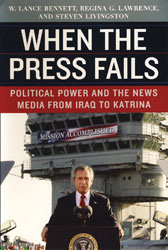|

Taking Apart Terrorism
 The Sept. 11, 2001, attacks on U.S. soil vanquished the insular notion that Americans are safe from global conflicts. As the World Trade Center towers collapsed and the Pentagon burned, the fear-ridden and confused wanted to know: Who are these unknown attackers, and why do they hate us? In The Mind of the Terrorist: The Psychology of Terrorism from the IRA to Al-Qaeda (Palgrave Macmillan, 2007), political psychologist Jerrold Post explores the psyche and motives that drive terrorism, arguing that those who join these evil ranks are more “normal” than we may think. The Sept. 11, 2001, attacks on U.S. soil vanquished the insular notion that Americans are safe from global conflicts. As the World Trade Center towers collapsed and the Pentagon burned, the fear-ridden and confused wanted to know: Who are these unknown attackers, and why do they hate us? In The Mind of the Terrorist: The Psychology of Terrorism from the IRA to Al-Qaeda (Palgrave Macmillan, 2007), political psychologist Jerrold Post explores the psyche and motives that drive terrorism, arguing that those who join these evil ranks are more “normal” than we may think.
Post, a 21-year-veteran of the CIA and founding director of the Center for the Analysis of Personality and Political Behavior, uses in-depth interviews, research, and memoirs of terrorist members to analyze—through their own words—the unifying messages that draw them together and sustain their devotion. Post says that most terrorists are not suffering from psychotic disorders but, rather, are searching for a “collective identity”; frustrated and alienated, they subordinate their individuality to serve the overarching causes of the group. Post specifically looks at three types of terrorists— national-separatist, social-revolutionary, and religious-extremist—through comprehensive histories of people stripped of their land, identity, or independence by skewed or self-serving governments. By shedding light on the terrorist psyche, Post attempts to illustrate how an otherwise ordinary person can turn to extreme violence—and how our understanding of this psychological mind-set can help us combat terrorism more effectively.
In concluding chapters, Post lists strategies and recommendations to curb these powerful motivations. He specifies that reforming education systems and helping autocratic leaders to open up societies are essential to preventing potential terrorists from forming these groups in the first place. “Hope,” Post writes, “is the antidote to despair. It is only when youth begin to be hopeful about their future and fully participate in their societies that we will see the plague of terrorism decline.”
Post is a professor of psychiatry, political psychology, and international affairs and the director of the University’s Political Psychology Program.
ProtectingPrivacy.com
 In an age of Google, Facebook, MySpace, and YouTube, there are almost limitless ways over a worldwide network to share information…even if it’s malicious or false. The Future of Reputation: Gossip, Rumor, and Privacy on the Internet (Yale University Press, 2007), by GW Law School Professor Daniel J. Solove, explores how this new online media gives us each a permanent, searchable record that can be broadcast to millions of strangers, pitting our right to privacy against our freedom of expression. In an age of Google, Facebook, MySpace, and YouTube, there are almost limitless ways over a worldwide network to share information…even if it’s malicious or false. The Future of Reputation: Gossip, Rumor, and Privacy on the Internet (Yale University Press, 2007), by GW Law School Professor Daniel J. Solove, explores how this new online media gives us each a permanent, searchable record that can be broadcast to millions of strangers, pitting our right to privacy against our freedom of expression.
Solove, an internationally known expert in privacy law, uses real examples of video, e-mails, or blogs gone wrong to identify the issues that most threaten privacy. In one well-known case, the “Star Wars Kid,” Solove examines whether individuals should have some control over the distribution of their own names and images: The highly publicized 2003 situation occurred when classmates posted online a teenager’s video of himself pretending to fight an imaginary enemy with a golf ball retriever. The video, viewed hundreds of millions of times over the Web, humiliated the 15-year-old, Solove says, while also forever labeling him the “Star Wars Kid” in cyberspace. Anyone is vulnerable to such public attacks, he writes, citing other high-profile examples of digital shaming, gossip, and scandalous sexual postings that are now instantly available to every employer, colleague, relative, date, or friend. “Whether you like it not, whether you intend it or not, the Internet can make you an instant celebrity,” Solove cautions.
In addition to anecdotes, Solove peppers the book with historical examples of privacy issues and his opinion on the role of law. As technology continues to evolve, Solove suggests that individuals inform themselves about the dark side of the Web, challenge data collectors, and bring the privacy law up to date by reaching a more careful balance with free speech. While it won’t be easy, Solove warns it is critical that we champion privacy protection efforts now. “After all,” he writes, “it’s just the beginning.”
The Spin Zone
 The American press in recent years has had a dangerously narrow scope of Washington journalism, tending to record rather than critically examine the official pronouncements of the government, laments journalism professor Steven Livingston. In When the Press Fails: Political Power and the News Media from Iraq to Katrina (The University of Chicago Press, 2007), Livingston and co-authors W. Lance Bennett and Regina G. Lawrence examine the complex relationships between reporters and the politicians they cover, arguing that journalists’ vast dependence on official sources has significantly affected the inclusion of dissenting views. The American press in recent years has had a dangerously narrow scope of Washington journalism, tending to record rather than critically examine the official pronouncements of the government, laments journalism professor Steven Livingston. In When the Press Fails: Political Power and the News Media from Iraq to Katrina (The University of Chicago Press, 2007), Livingston and co-authors W. Lance Bennett and Regina G. Lawrence examine the complex relationships between reporters and the politicians they cover, arguing that journalists’ vast dependence on official sources has significantly affected the inclusion of dissenting views.
Through interviews with reporters and analysis of mainstream press coverage, Livingston shows the media’s reluctance to use other credible sources when high-level officials have not publicly raised questions during George W. Bush’s tenure, including in the response to the Sept. 11 terrorist attacks, the buildup to war with Iraq, and the Abu Ghraib scandal. “It is as though issues appear and disappear in the news depending on which official wand is waved at them,” Livingston writes.
In his suggestions on how the press can recover, Livingston details the refreshing independence the media gained in the aftermath of Hurricane Katrina, when an unprepared administration was unable to spin the story. He and his colleagues urge reporters to break free of their cozy insider relationships and recognize their invaluable role as watchdog. “More independence by individual news organizations—more willingness to break free of the ‘pack’—would in turn lead us closer to the marketplace-of-ideas model of press performance,” he writes.
Livingston is associate professor in the School of Media and Public Affairs and in the Elliott School of International Affairs.
—Jaime Ciavarra
|